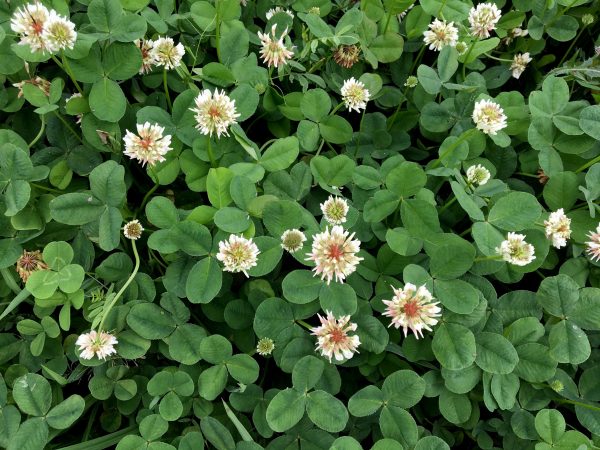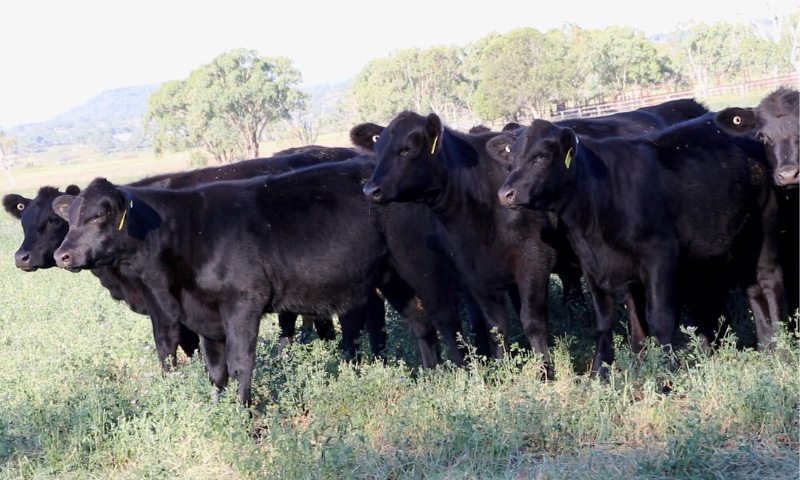According to the Merck Veterinary Manual (2005) the definition of Bloat is an over-distention of the rumeno-reticulum with the gases of fermentation, either in the form of a persistent foam mixed with the ruminal contents, called primary or frothy bloat or in the form of free gas separated from the ingesta, called secondary or free-gas bloat. Bloat is simply the build-up of gas in the rumen that is unable to be released. Bloat is a risk when animals are grazing young, lush pasture, and particularly pasture that has a high legume content (clover, medics or Lucerne).
Frothy bloat is highly seasonal (it usually occurs in Spring) and is caused by natural foaming agents in legumes, and some rapidly growing grasses that trigger a stable foam to form in the rumen. Gas is trapped in small bubbles in this foam and the animal cannot belch up the gas, resulting in the pressure building up in the rumen and causing an obvious swelling on the left side of the body.
Free-gas bloat is caused by a physical obstruction such as a foreign body (often potatoes or apples) becoming lodged in the gullet that prevents the belching of gas.Cattle with bloat may display the following signs:
- A distended left abdomen
- No longer grazing
- A reluctance to move
- They appear distressed – pain, bellowing, bulging eyes
- Strain to urinate and defecate
- Rapid breathing – mouth could be open with the tongue hanging out
- Staggering
- In advanced cases the animal will go down and death quickly follows due to the swollen rumen compressing the lungs, interfering with breathing and obstructing blood flow. Death is due to heart failure and asphyxia.
Bloat in sheep is usually less severe than in cattle and is often associated with pulpy kidney (enterotoxaemia). A recommended prevention strategy is to vaccinate sheep against clostridial disease (5in1) before giving them access to lush pasture or when bloat occurs in the flock.
Early and mild cases of bloat can be treated by administering anti-bloat preparations. It is important to keep animals moving to assist the preparation to mix with the foamy rumen contents.
Moderately affected stock showing signs of distress need veterinary attention. Severely bloated and distressed animals need rapid relief via surgical means. A wide bore (14g) needle or trocar is used to stab the rumen high on the left flank where the swelling is greatest and Veterinary attention is necessary to irrigate the abdominal cavity, clean and stitch the wound and provide antibiotic treatment to prevent serious infection.
Preventing bloat is an important priority not only to reduce deaths but also to reduce the negative effect of bloat on livestock performance. Hungry animals should not be allowed to gorge on legume rich pasture. Feeding out grass hay or straw a few hours before introducing cattle to risky pastures can help reduce their appetite. Initially, stock should be given limited access to pasture and monitored closely during grazing and immediately after removal. If possible, introduce livestock to a risky pasture when the pasture sward is longer. As the height of the clover increases, generally the risk of bloat will decrease. Cattle should become accustomed to dangerous pastures over several days and modify their intake to reduce bloating.

Other preventative measures that can be implemented are: incorporating bloat resistant legumes, such as Lotus corniculatis, into pasture mixes, spraying pasture daily with pasture oil, drenching cattle twice daily with anti-bloat preparations or oil, adding bloat oil to water supplies, using anti-bloat supplements and if hand feeding each day, adding liquid bloat preventatives or products containing monensin into the feed.
MegaMin Lush Legume Lick is a broad spectrum macro and trace mineral supplement with simple carbohydrates and Rumensin to aid stock grazing legume rich pasture (Rumensin® also acts as an aid in the control of bloat in feedlot and dairy cattle when mixed and fed in accordance with Elanco recommended rates).
Rapidly growing legumes, lush green pasture and forage crops can have excessive amounts of some nutrients such as potassium and can be very limiting in others like magnesium. Livestock that are grazing these plants in their vegetative growth stages can be prone to develop conditions such as scours, bloat and grass tetany. MegaMin Lush Legume Lick has been formulated to help balance minerals and support rumen microbial populations to help promote production in stock grazing lush green feed.
By Shannon Godwin (BAppSC GDTL)
